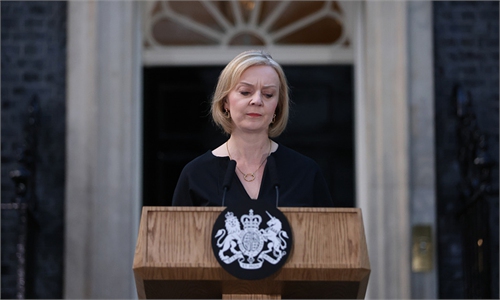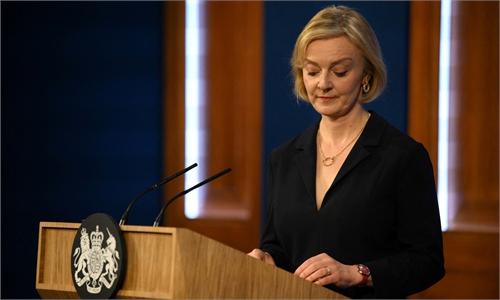Can the resignation of Truss save the UK as it is sliding into an economic abyss?

Illustration: Chen Xia/GT
Political chaos in the UK has become commonplace since Brexit in 2016. Liz Truss, the new British prime minister who has just served for 45 days, announced her resignation on Thursday. It is the shortest tenure of any UK prime minister. This is something that has not happened in modern British politics for a century. The Conservative Party seems to have realized that the new prime minister, who has vowed to be the modern "Iron Lady," is unable to take on the arduous task of revitalizing the British economy.But the question is: Can the resignation of Truss truly revive market confidence?
It is a hasty judgment to blame the current economic problems in the UK simply on the unpopularity of Truss' tax-cut plan. Tax cuts are not without merit in stimulating economic growth. However, the real concern is: Is the market still interested in what constitutes an effective economic growth policy?
Among the numerous comments, the following two standpoints have been repeatedly mentioned by experts from different political camps: First, even if an effective economic development strategy is proposed now, it will take time to implement it. Can the UK still wait? Second, what is exactly dragging down the UK economy? The government has not thoroughly analyzed what kind of political and social environment is needed for social and economic growth.
Now the British government seems to be really thinking about the problem "seriously." Nevertheless, not long ago, the world economic community has predicted that the UK is currently "on the brink of recession" and that the UK economy has entered a "technical recession." When the market and the public have lost patience and economic recession has become the "general anticipation" of British society, any policy will be of no avail. Ineffective social governance has undermined the foundations of the British economy. "Small government, big society" was once the proud political label of British and American political culture. British parliamentary debates have also been portrayed as the standard of modern political life.
However, after Brexit, social and livelihood issues have not been effectively addressed, and the plight of domestic and foreign affairs has not really been responded to. Politicians in the UK shuttle among meetings discussing various proposals, and staging political shows, which is the norm in British political life nowadays.
Any capital would like to have a lasting and stable investment environment, a healthy and promising political system, and an optimistic and positive social mentality. These extremely important elements of the investment environment are scarce in the UK today.
The ideologicalization of the British economy has greatly depleted the key elements of British development. The British economy is fundamentally based on commerce and free trade, which is the secret of its continued prosperity in recent history. However, the international community has witnessed the British government's economic policy sliding into an ideological abyss in recent years.
In the Russia-Ukraine conflict, the British government used extreme measures to deal with Russian assets in the UK on the grounds of sanctions against Russia, which is tantamount to burying the sacred rules and open principles of the British market with its own hands. In its relations with China, the UK has repeatedly weaponized the concept of "national security" and created artificial barriers in the fields of 5G application, commercial investment, and scientific and technological cooperation. How can a country that lacks basic commercial credibility and continuity of economic policies build an international business environment that is adapted to the country's economic development?
If the UK wants to gain lasting momentum for future economic growth, it must rebuild its strategic awareness for the future world. We live in a world of violent turbulences and changes. The essential features of this change are not only the transfer of the world's economic center, but also the self-development and transformation of the cultural destiny of all countries in the world.
The UK is a pivotal country with global historical significance. It has injected political ideology and economic development concepts with extensive influence into world modernization. However, world history cannot always proceed mechanically in the direction set by a few Western countries. Modern human civilization needs new concepts.
Unfortunately, the mainstream ideology of British politics is based on zero-sum game and the law of the jungle during the Cold War, a cultural mentality that will probably lead to social unrest far more violent than economic recession.
The author is director of the Center for British Studies at Shanghai International Studies University. opinion@globaltimes.com.cn


